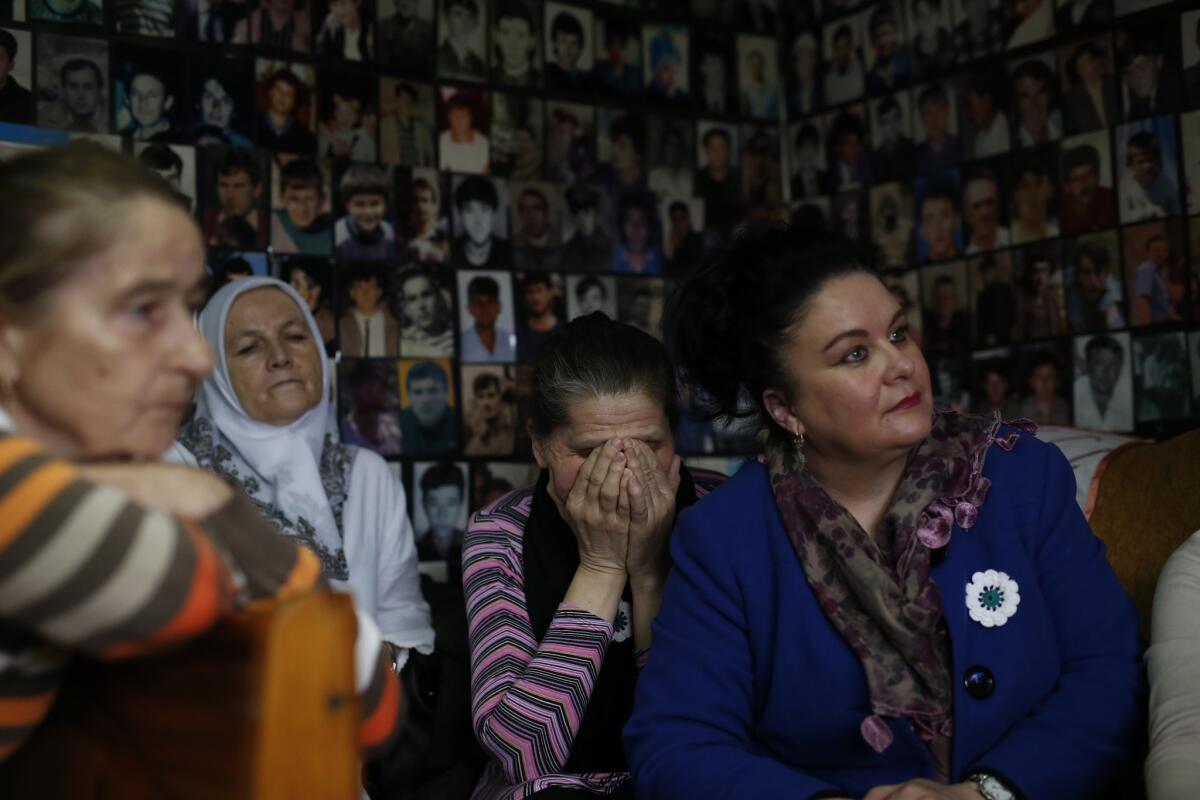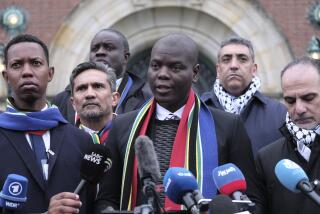Op-Ed: The little genocide: A Karadzic conviction in The Hague that will satisfy no one

Women who lost family members in Srebrenica react as they watch a broadcast of the sentencing of Radovan Karadzic in Tuzla, Bosnia on March 24.
- Share via
The International Criminal Tribunal for the Former Yugoslavia on Thursday issued its judgment against Radovan Karadzic, the president of the Serb Republic during the 1992-95 Bosnian War. Karadzic was convicted of various crimes, including genocide. But only a little.
After a trial lasting seven years, the tribunal at The Hague found Karadzic guilty of genocide for his role in the murder of 8,000 unarmed Muslims at Srebrenica in the war’s final months in 1995 — but not for the systematic slaughter in seven other municipalities. So he committed genocide in one place over one week, and nowhere else in the 3½-year war he helped mastermind: a little genocide.
Although that result might sound shocking, it was no surprise. In 2012, the court threw the broader genocide charge out, only to be ordered to reinstate it on appeal. But with the same three judges evaluating the evidence, acquittal was a foregone conclusion.
Denialism remains rife. Far from condemning Karadzic, Serbs are honoring him; just this week, the current president of the Serb Republic named a student dormitory after him.
More fundamentally, this little genocide is consistent with the tribunal’s jurisprudence. In case after case, prosecutors have charged Bosnian Serbs with genocide. And in case after case, the court has acquitted indictees everywhere except Srebrenica, even when they have been convicted of other horrible crimes. Goran Jelisic, the self-described Serbian Adolf, pleaded guilty to 31 counts of crimes against humanity and war crimes in northern Bosnia, but refused to plead to genocide, and was acquitted.
Why has a broader genocide conviction proved so elusive? Prosecutors must prove that a defendant not only intended to kill or rape, usually on a mass scale, but to destroy the group to which the victims belonged as such — as a group. Yet more than evidentiary standards, it is the grotesque prestige attached to genocide that makes it such a useless tool in law: Genocide’s status as the supreme crime means judges instinctively ration its moral and legal sanction.
Observers have criticized and defended the court’s narrow, cautious approach. But right or not, narrowness has produced an outcome that satisfies no one, letting one site of horror and one week of slaughter stand in for a lengthy war and its countless killing fields.
Bosnian Muslims view it as an article of faith that genocide occurred throughout Bosnia. So while they welcome official confirmation of Srebrenica, they are disappointed that the tribunal has failed to recognize the full scale of their suffering. There is a political aspect too: Some Bosnian Muslims want to use a broader genocide ruling to argue that the entire Serb Republic is the product of genocide — that it could not exist without genocide — and push for its dissolution on those grounds.
For Bosnian Serbs, it’s the other way around: There was no genocide, so even the finding for Srebrenica is too much. Denialism remains rife. Far from condemning Karadzic, Serbs are honoring him; just this week, the current president of the Serb Republic named a student dormitory after him.
There are still a few chances for a broader genocide conviction. The prosecution will probably appeal the acquittal, and Gen. Ratko Mladic is still on trial, charged with genocide for Srebrenica and 15 other municipalities. If the prosecution ever finally succeeded, however, a different problem would arise. How much inconsistency across its cases can the court sustain? How can the commanders be guilty, and not the midlevel officials and the foot soldiers?
Not that one consistent narrative would necessarily prove more effective, because who would listen? There is no prospect that a sweeping conviction would change hearts and minds in Bosnia’s deeply divided society, where polls repeatedly show that opinions about the international court’s judgments are strongly correlated with ethnicity.
Nor is it clear that a broader finding would somehow improve the objective record, the well-documented litany of murders, rapes and depredations for which Karadzic has just been sentenced to 40 years in prison. A genocide conviction would add only a contested interpretation to that record. And a rather strange one at that, for genocide tells us that men and women died not as individuals but as members of a group, that it is their collective identity that matters. For some, that is an essential truth, but it is also an interpretation that does its own violence and veiling.
Although genocide may be a morally meaningful concept, as a legal category it is a distraction that encourages survivors, courts and the rest of us to bicker over how to name our inhumanity. But it does not motivate us to prevent great evil. What two decades of law have actually brought forth in The Hague is no monument, and no match, for the horror it seeks to describe and circumscribe. Too little or too much, it’s too late.
Karadzic’s conviction comes one week after the United States officially declared that the Islamic State is committing genocide in Iraq. Reflecting current fashions in thinking about law and conflict, Secretary of State John F. Kerry reflexively called for official investigations and trials, but no change in policy. If this week’s judgment — more than 20 years after the end of Bosnia’s war — is any indication, that’s the wrong focus, especially for a genocide that is still going on.
Justice has scales, but it has a sword too. Without the latter, justice will be a long time coming, and won’t have much to show, or to save, when finally it arrives. That’s the real lesson of Srebrenica, and whatever happened in the rest of Bosnia: Even little genocides are too much to leave to the law.
Timothy William Waters is professor of international law at Indiana University Maurer School of Law. A former researcher for the prosecution at the International Criminal Tribunal for the Former Yugoslavia, he is editor of “The Milosevic Trial — An Autopsy.”
Follow the Opinion section on Twitter @latimesopinion and Facebook
More to Read
A cure for the common opinion
Get thought-provoking perspectives with our weekly newsletter.
You may occasionally receive promotional content from the Los Angeles Times.









